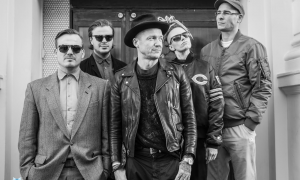Home » Jazz Articles » Live Review » The Vince Ector Group at Cecil's Jazz Club
The Vince Ector Group at Cecil's Jazz Club
Cecil's Jazz Club
West Orange, NJ
April 28, 2006
The opening set at Cecil's Jazz Club was the first time The Vince Ector Group worked together as a unit. Instead of the familiar language of a standard repertoire, Ector choose to perform mostly material from his two records as a leader, Rhythm Master (Blues Leaf Records), and Renewal of The Spirit (Mambo Maniacs Records). There was also nothing safe about the band's approach to improvisation. Abrupt changes in emphasis and direction arrived without warning; yet Ector always made certain that the music's continuity was never in jeopardy.
Ector led the trio from his drum kit, flashing a huge grin and nodding in the direction of organist Akiko Tsuruga when they connected to make a particularly telling point. The band opened with "South Philly Groove, Ector's medium tempo shuffle. Tenor saxophonist Jay Collins played the melody accompanied by Tsuruga's muscular chords. His solo featured a long stream of notes that galvanized the band, followed by a stirring high-to-low note sequence. Ector's four bar trades with Tsuruga and Collins shifted into an extended turn. He began on just the drums before unleashing long waves of sound via the two top cymbals. Then the bass drum became the focal point, leading to snapping snare drum figures and melodic-sounding tom-tom cadences.
Ector's African-influenced rhythms kicked off Wayne Shorter's "Night Dreamer. A steady rain of cymbal sounds led to repeated two-stroke beats to the mounted tom-tom. From this foundation he added organized patterns to the floor tom-tom and bass drum, then another volley to the cymbals before cueing the band with a Latin-jazz beat in three-quarter time. Tsuruga's solo was an example of her exceptional rapport with Ector. She's a mercurial performer who establishes an idea but doesn't linger too long before moving on to something different. As Ector matched every change in direction, Tsuruga blithely danced across the keyboard, dug deep into the pocket, and then executed resolute chordal passages.
Collins' flute introduced "What's New, the set's only standard. Emphasizing cymbals and ringing tom-toms, Ector established a nice samba groove. Tsuruga's solo began with flowing song-like lines before becoming more pronounced and soulful. Often alluding to the melody, Collins' airy thoughts gradually started to climb while Ector briefly pounced on the toms and snare.
"That felt like I ran a marathon, Ector cracked after the trio's workout on "Premonition, Collins' medium-to-up tempo swinger. The composer's long solo displayed his customary rounded tone, and individualistic take on the modern tenor saxophone vocabulary. He placed one burly phrase on top of another, sometimes hitting the upper register of the horn for effect. Four, five, and six note combinations turned into brief blues shouts; and long, winding Coltrane influenced lines morphed into a repetitive, speech-like pattern.
They continued to work up a sweat during "Melly's Blues, a bright medium tempo tune written for the leader's daughter. Ector's neighbor, trumpeter Jeremy Rivkin, joined the band. His solo began in slow motion, as if weighing the value of each note, before hitting a long high one and adding some descending phrases. Collins offered some of his most exciting work of the set, moving between honks, somewhat smoother statements, blunt declarations, and swirling lines. Picking-up from Collins' last notes Tsuruga held her own amidst spontaneous combustion by the entire band, in the form of raucous riffs and Ector's blunt tom-tom fills. Combining melodic grace and raw power, she built to a climax with active phrases over a sustained chord, mulled over combinations of four notes, and attached a sequence of energetic chords that had the audience yelling for more.
"An Eddie Harris thing, Ector muttered to the horns as they deciphered the chart of his composition, "Renewal of The Spirit, a mixture of two varieties of funk. For his solo Collins switched from tenor to flute, sounding both delicate and ardent. Despite briefly cutting loose with some skittering runs, Rifkin never quite found his bearings. After a repeat of the head, Ector brought things to a close with a short series of two bar exchanges with the band.
Tags
PREVIOUS / NEXT
Support All About Jazz
 All About Jazz has been a pillar of jazz since 1995, championing it as an art form and, more importantly, supporting the musicians who make it. Our enduring commitment has made "AAJ" one of the most culturally important websites of its kind, read by hundreds of thousands of fans, musicians and industry figures every month.
All About Jazz has been a pillar of jazz since 1995, championing it as an art form and, more importantly, supporting the musicians who make it. Our enduring commitment has made "AAJ" one of the most culturally important websites of its kind, read by hundreds of thousands of fans, musicians and industry figures every month.
























